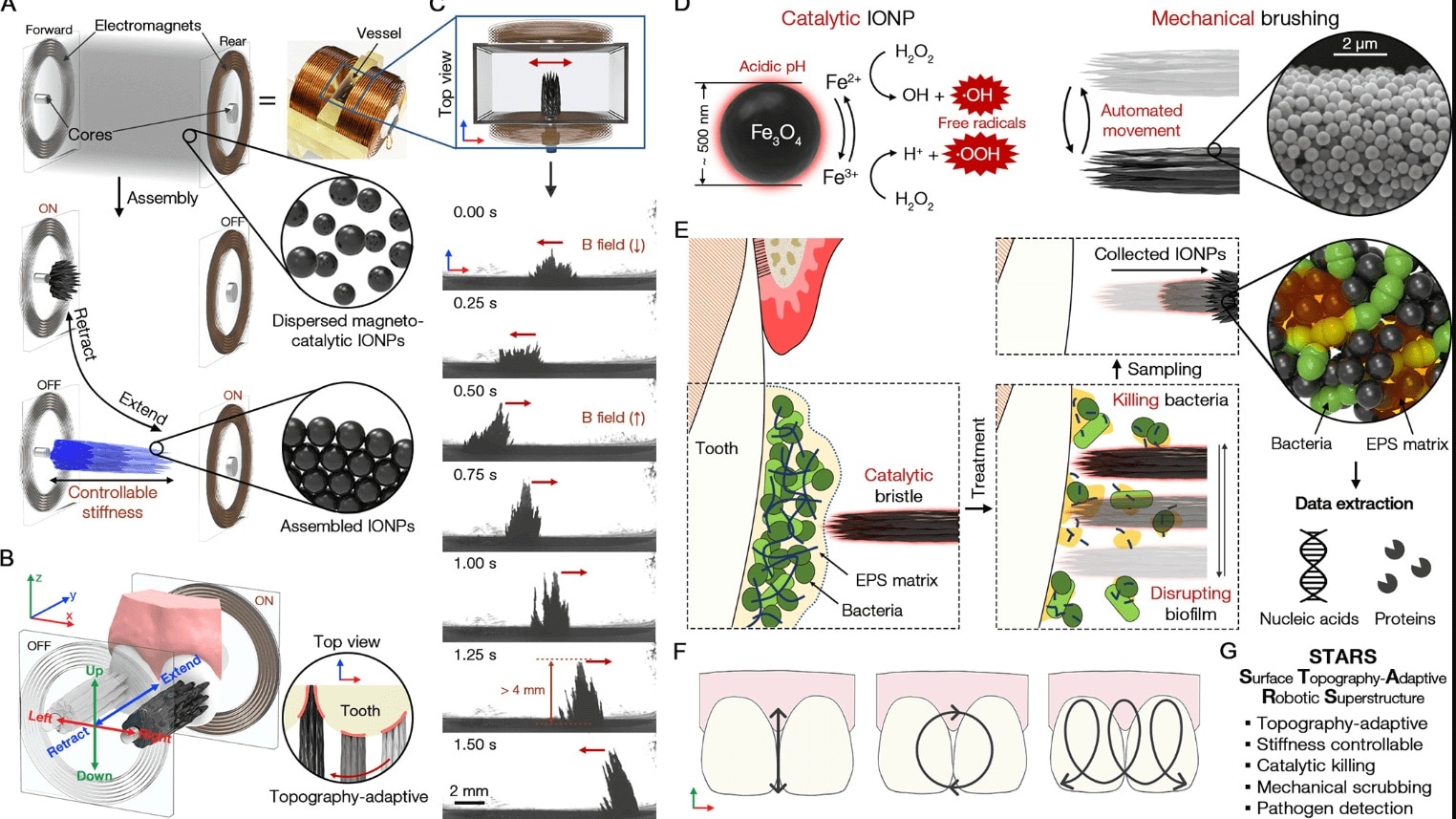In a recent study published in the scientific journal ACS Nano, researchers described how they used a tiny robot to clean the entire oral cavity. The researchers created a swarm of "iron oxide nanoparticles", which they controlled using a magnetic field

In the movie "Terminator 2" a robot is shown that is able to change shape at will. In fact, it is made of a type of "liquid metal" that can liquefy and resolidify in any form: as a sword, a rifle, a knife and many other killing tools. Now that future is finally starting to reach us, but we may see such robots not when they hunt us in malls and streets, but when they hunt bacteria between our teeth.
And let's be honest: they will find a lot of bacteria there.
It is not easy to maintain dental hygiene. I know that was a sharp jump, but let me. Brushing our teeth is not a great pleasure, and somehow it seems that no matter how hard we try - the dentist will still be disappointed with us at the next visit. The reason is that it is difficult for us to reach all tooth surfaces with a brush - and even with dental floss or toothpicks. Bacteria, on the other hand, have a pseudo-free hand all over the mouth, and are able to enter even the narrowest spaces between the teeth and grow there safely. They devour the sugar in the food that reaches the mouth and secrete acid that destroys the enamel that protects the teeth. From there the road is short to a hole in the tooth at best, and to the dentist's new Tesla at worst.
But the terminator (2) can help us.

In a recent study published in the scientific journal ACS Nano, researchers described how they used a tiny robot to clean the entire oral cavity [Link]. The researchers created a swarm of "iron oxide nanoparticles", which they controlled using a magnetic field. The particles could connect to each other in different ways by activating the magnetic field in the right strengths and directions. The entire swarm is, in fact, one robot that is able to change shape according to the instructions of the researchers. They ordered it, for example, to crystallize into structures of different shapes, lengths and levels of strength and stiffness. They could create 'brush bristles' with lengths ranging from millionths of a meter to centimeters, and make them move in the most suitable way for cleaning the teeth. All that was needed was one command, so that the bristles of the brush would 'melt' and solidify again to penetrate even the densest areas between the teeth and remove even the most stubborn bacteria.
The researchers did not do all this in the mouth of a human experimenter, but on individual teeth in the laboratory. The system has proven to be able to do more than simply clean between the teeth: the tiny nanoparticles can actually undermine and break the biofilm structure, which is the layer that the bacteria secrete around them to protect themselves from the toothbrush. That is, they reach a level of performance that we have to go to the dentist to enjoy it. Along the way they can also collect bacteria samples from the mouth.
Will we get to see these robots reach our mouths? Maybe. This is currently only a preliminary demonstration of the concept's feasibility under laboratory conditions, but since the nanoparticles are magnetic, there is not much fear that they will get lost in our bodies - unless, of course, we swallow them. It wouldn't surprise me to find out in a decade or two that the dentist will ask us to gargle such a robotic solution and let it clean our mouths from the inside for a few minutes. At the end of the process, we will spit it out - and we will find that she left clean and shiny teeth behind. All this - without pain and without fear.
In the first stages, such a procedure will be performed only in a clinic, in a well-controlled environment. But when the technology is perfected, it will also be able to reach the home. It does not have to be expensive: the production of nanoparticles is not necessarily expensive, and the device that will produce the magnetic fields inside the mouth will be suitable for repeated use. This could be the electric toothbrush of the future - but without the tedious mechanical operation we have to do today.
None of this will happen tomorrow morning. far from it. Even in the most optimistic visions, it is hard to believe that we will reach such achievements by the end of this decade. Such a product will have to go through stringent and rigorous tests, and of course - it will be necessary to convince consumers to put a liquid robot in their mouths.
But one way or another - we will still enjoy it.
Why am I so sure? Because the robot described in the article is just one representative example of the larger trend of miniaturizing our machines. The final shape of the machines - and even their exact nature - are less important. What matters is the size. Maybe the robots that will clean our mouths won't be "iron oxide nanoparticles" after all. Perhaps they will be bacteria that have been genetically engineered and reprogrammed to fight their harmful cousins. Maybe it will be sound waves that will break the biofilm on the teeth. The end result will be the same: new and more efficient ways to clean the mouth and maintain dental hygiene at a level that far exceeds the one we enjoy today. And of course - with much less effort and suffering.
And for me personally - as someone who disappoints his dentist every time - it's hard to wait anymore.
More of the topic in Hayadan:
- Researchers at the Technion, in Spain and in the UK present a new-old approach to disinfecting air and surfaces from the corona virus
- Cancer research: a dramatic improvement in the effectiveness of gene therapy
- break the water
- Gold nanoparticles purified the air from pollution
- Silver nanoparticles used in an innovative spectroscopic method
